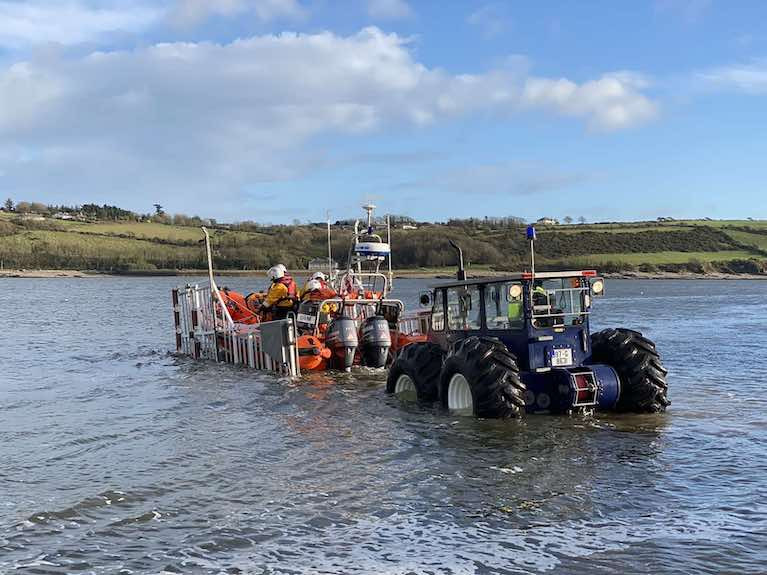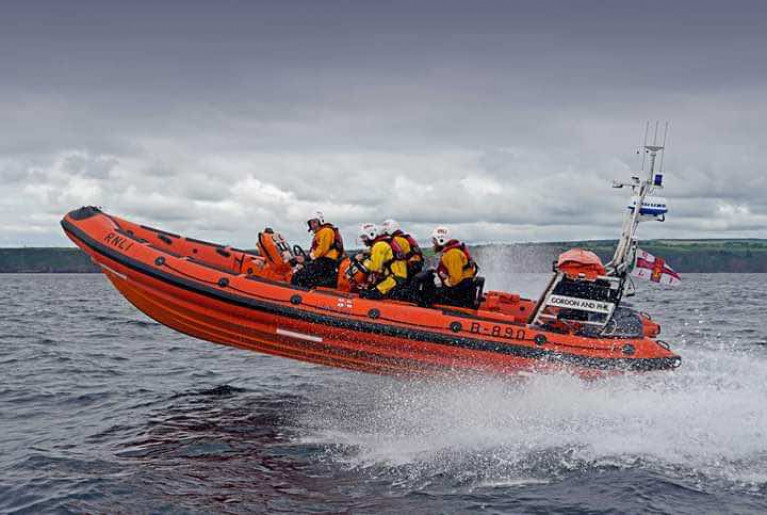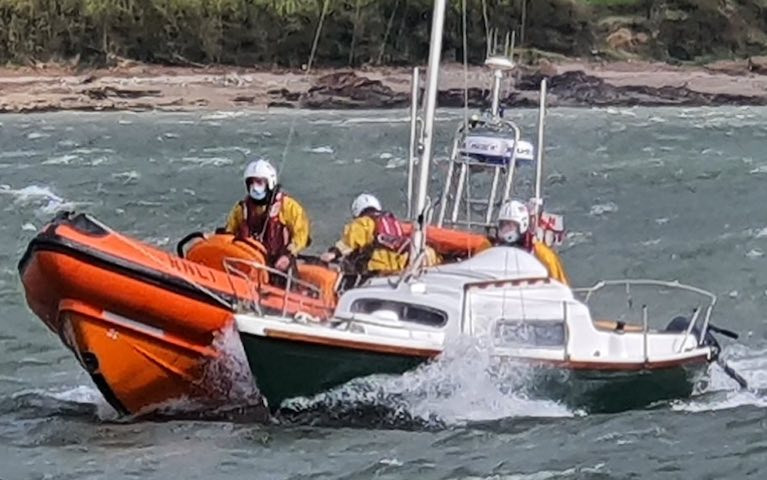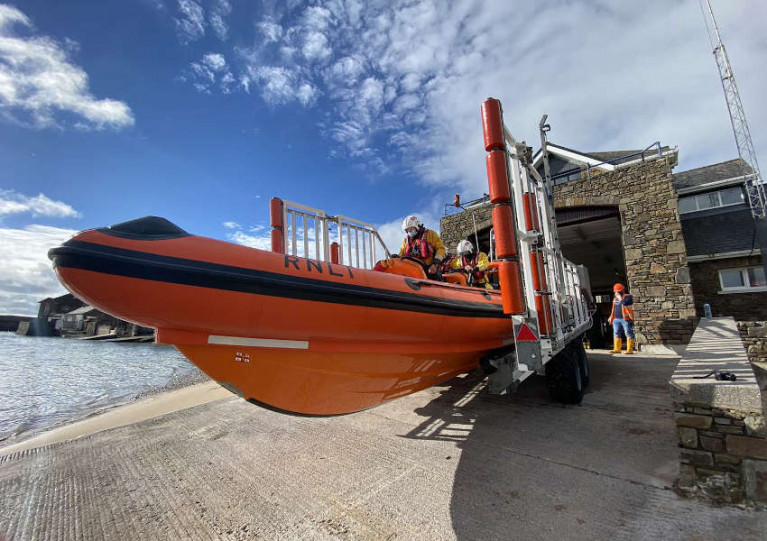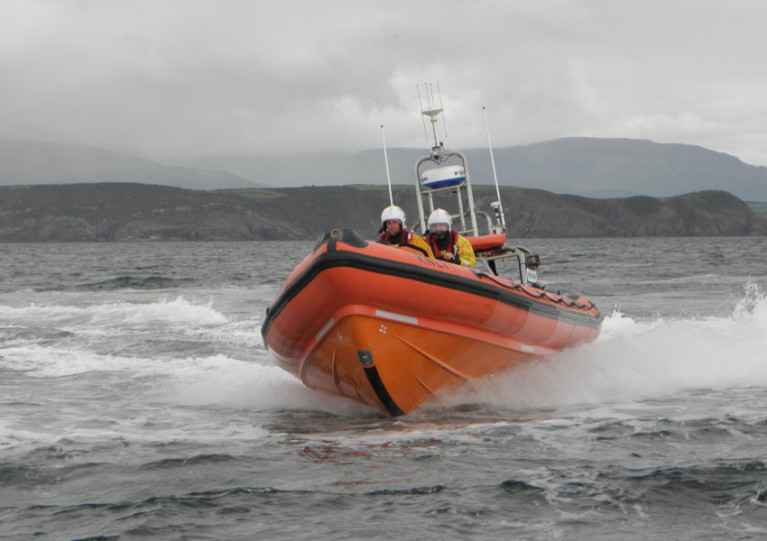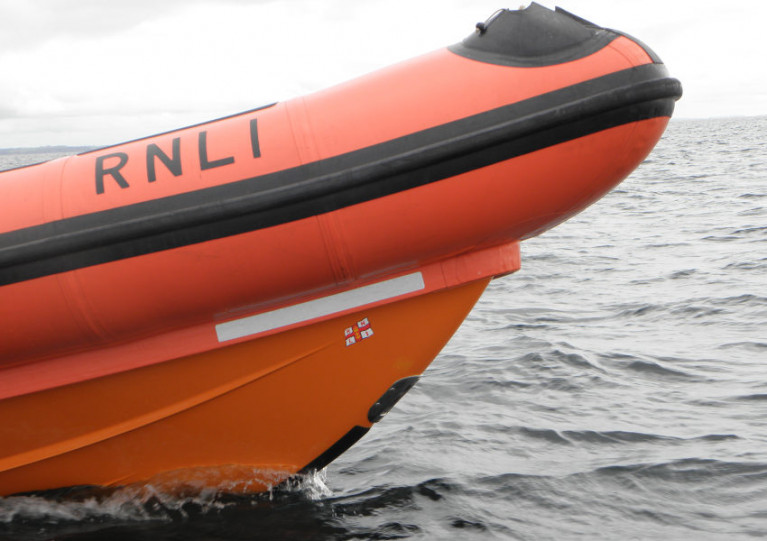Displaying items by tag: youghal
The volunteer crew of Youghal RNLI were paged today (Tuesday 4 May) at 4.31 pm to a report of two people in a small boat who had failed to return from a pleasure trip in the Redbarn area of Youghal Bay.
Arriving in the area eight minutes later, the lifeboat crew located the two people in the small, 2.5m boat approximately 1 mile offshore from Redbarn beach. They were struggling to row the vessel against an ebbing tide and a north-westerly force 5/6 offshore wind after the engine had failed.
Both casualties, who were wearing lifejackets, were brought aboard the inshore lifeboat, where it was established all was well with them. The boat was then towed safely back to Redbarn beach. The two people were then handed over into the care of the awaiting Youghal Coast Guard unit. No medical assistance was required.
Speaking after the call out Mark Nolan, Youghal RNLI Deputy Launching Authority said: ‘Today’s rescue highlights the importance of always letting someone know an estimated time of your return. Had friends and family of these people not been expecting them and had not raised the alarm when they didn’t return, the outcome could have been very different. They did the right thing in calling 112/999 and asking for the Coast Guard’
He went on to say ‘Today’s shout out was the fourth one in a week, I’d like to thank all our volunteers for responding to their pagers in what has been one of the busiest weeks in our station's history’.
For the third time this week, Youghal RNLI responded to their pagers on Saturday, May 1 at 3.08 pm to a report of a 17ft angling boat with engine trouble, half a mile south of the Eastern Cardinal in Youghal Bay.
The lifeboat crew under the Helm of Liam Keogh launched the Atlantic 85 inshore lifeboat in calm, sunny conditions and arrived on scene in less than 10 minutes.
They established a stern tow with the casualty vessel and towed it safely to the pontoon in Youghal quay.
The lifeboat returned to the boathouse where with the help of the shore crew, the lifeboat was washed down and refuelled.
Multi Rescue Agency Response off Youghal as Sailing Dinghies Capsize – Five People Rescued
Volunteer lifeboat crew with Youghal RNLI rescued five people from the water off Capel Island near Knockadoon in the Youghal Bay area this afternoon (Monday 5 April) when the two GP14 sailing dinghies they were in capsized leaving one adult and four teenagers in the water. The launch request for the lifeboat was made by the Irish Coast Guard and the lifeboat crew were joined in the rescue by Ballycotton RNLI, Youghal Coast Guard Unit, Rescue 117 and the Irish Lights Vessel, the Granuaile, along with local Gardaí and paramedics in a multi-agency response.
Launching at 3.23 pm in cold, choppy conditions, the inshore lifeboat arrived at the location within 15 minutes to discover three people holding onto an upturned boat. The volunteer lifeboat crew quickly brought all three people on board the lifeboat. As they were carrying out the rescue they learned of a second sailing boat having capsized approximately half a mile away. The second boat, which had been out on the water with the first one, was quickly located and two people were rescued from the water by Youghal lifeboat crew.
 As the RNLI were carrying out the rescue they learned of a second GP14 having capsized approximately half a mile away
As the RNLI were carrying out the rescue they learned of a second GP14 having capsized approximately half a mile away
All five people were taken to Knockadoon pier after being in the water for approximately 30 minutes and handed over to the care of the Youghal Coast Guard unit and Ambulance service. Rescue Helicopter 117 and the Gardaí were also on scene.
Youghal RNLI then returned to the capsized vessels and with the assistance of Ballycotton RNLI and the Granuaile, both boats were righted and towed back to Knockadoon pier.
 The five GP14 sailors involved were all wearing lifejackets, they had a personal locator beacon, which activated when they entered the water and they also had a mobile phone, which they used to call the emergency services
The five GP14 sailors involved were all wearing lifejackets, they had a personal locator beacon, which activated when they entered the water and they also had a mobile phone, which they used to call the emergency services
Speaking after the call out Mark Nolan, Youghal RNLI Deputy Launching Authority said: ‘The successful outcome to today’s incident is largely due to the safety measures taken by the five people involved. All were wearing lifejackets, they had a personal locator beacon, which activated when they entered the water and they also had a mobile phone, which they used to call the emergency services. All three things enabled a swift response and a successful rescue from all the agencies involved.’
‘I would also praise the actions of our volunteer lifeboat crew here in Youghal who took the five casualties from the cold water. We wish the five people who were rescued a speedy recovery.’
Barry MacDonald, Ballycotton RNLI Coxswain also added his praise to the volunteers involved for their timely response.
The volunteer crew of Youghal RNLI were tasked this evening (16 January 2021) to reports of people seen on the rocks near Easter point, while conducting the search they were tasked to reports of kayakers in trouble near Capel Island.
Launching at 6 pm in calm conditions, the inshore lifeboat began a search of the area around Easter point with the Ardmore and Youghal Coast Guard units searching on land. During this search, the crew received a report of kayakers in trouble near Capel Island.
Youghal lifeboat was then tasked to go to Capel Island, along with Ballycotton RNLI, Youghal Coast Guard unit and Rescue helicopter 117. On arrival, the crew could see flickering lights coming from the Island.
Two crew members from Youghal RNLI went onshore and found four members of the public safe and well and planning to camp on the Island. The call-out was treated as a false alarm with good intent and the crew were stood down from this call and asked to return to Easter point to continue the original search.
After a thorough search of the Easter point area with nothing found the crew were stood down at 7.38 pm and returned to the station.
Speaking after the call outs, Derry Walsh, Youghal RNLI volunteer Lifeboat Operations Manager said: ‘Although both call outs this evening proved to be false alarms with good intent, I would urge the public to always call 112/999 and ask for the Coast Guard if they think they see someone in trouble, it is always better to be safe than sorry’
Youghal RNLI Assist in Search for Missing Person
Youghal RNLI was tasked yesterday at 1.45 pm by the Maritime Rescue Coordination Centre to reports of a missing person in the Ardmore Bay area of County Waterford.
Assisting the Ardmore Coast Guard Unit and Rescue Helicopter 117 in an ongoing search for a missing person, the volunteer crew launched in cold conditions, with force 4 to 5 North Westerly winds to conduct a low water search.
The Atlantic 85 inshore lifeboat covered the area from Whiting Bay to Goat Island to Ram Head and into Ardmore Bay.
Due to worsening weather conditions, the lifeboat was stood down at 4.15 pm, the search will resume this morning weather permitting.
The Volunteer crew of Youghal RNLI were requested to launch this evening at 5.20 pm to reports of a lady cut off by a rising tide near the pier at Knockadoon.
The Atlantic 85 inshore lifeboat arrived on the scene at 5.32 pm and quickly located the lady on the rocks cut off by the rising tide. One of the lifeboat crew entered the water and swam ashore to the woman, staying with her until Rescue helicopter 117 arrived on the scene a few minutes later. The lady was then airlifted to safety and handed over to the awaiting Coast Guard unit. She was assessed by the Coast Guard and no medical attention was needed.
Weather conditions were calm with good visibility.
Speaking after the shout Mark Nolan, Youghal RNLI volunteer Deputy Launching Authority said: ‘Tide times and heights can vary and can easily catch you out. Tidal cut off can be dangerous so we would remind everyone before they head out to make sure it’s safe and to check tide tables. While you are out it is important to be aware of your surroundings and the tide’s direction. Should you get into difficulty dial 999 or 112 and ask for the Coast Guard’.
Youghal RNLI Launch to 19ft Yacht Free of its Mooring
Youghal RNLI in East Cork responded to the pagers today to a report of an unmanned yacht dragging its moorings in Youghal harbour.
At 4.32 pm the volunteer crew launched the Atlantic 85 inshore lifeboat in fresh conditions and strong northerly winds. The 19ft-yacht had broken its moorings and was entangled in the moorings of another vessel. Once on scene, the crew quickly freed the yacht. A tow was established and the vessel taken to a secure mooring a short distance away.
The crew under the Helm of Erik Brooks returned to the station at 5 pm where with the help of the awaiting shore crew a thorough clean of the lifeboat and all equipment was undertaken in line with the RNLI and Government guidelines regarding the Coronavirus.
John Griffin, Youghal RNLI Volunteer Deputy Launching Authority said:’With the strong wind today the swift response meant that the casualty vessel was brought to safety before any damage could occur. It was a good team effort by the volunteer crew’.
Swimmer Dies After Getting Into Difficulty Near Youghal
A man has died after getting into difficulty while swimming of the cast near Youghal last Friday (18 September).
Youghal RNLI was called to the scene at Caliso Bay in Co Waterford on Friday afternoon after the man was reported missing to the coastguard.
A lifeboat crew member quickly spotted the casualty in the water and he was brought on board. Volunteers started CPR while the lifeboat returned to station.
CPR continued in the boathouse until paramedics arrived. However, the man was pronounced dead by a doctor shortly after.
“All members of Youghal RNLI would like to offer their sincere condolences to the man’s family and friends at the sad time,” said the station’s press officer Lou Stepney-Power.
“I would like to thank all the lifeboat and medical crew involved today for their efforts in a difficult situation.”
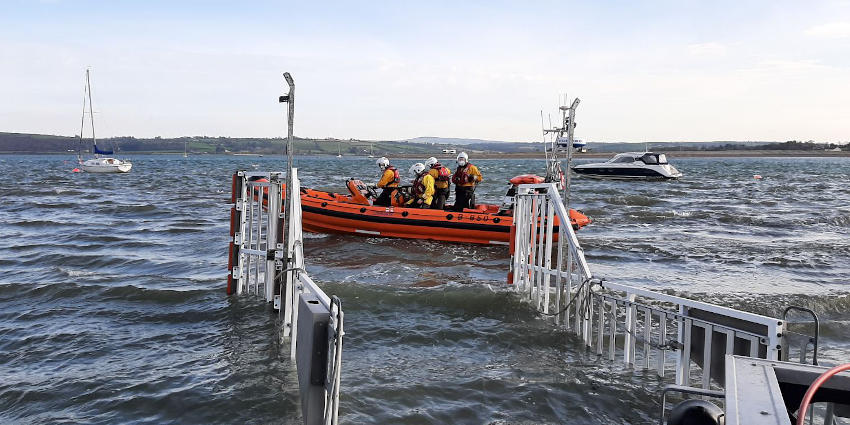 Youghal RNLI’s inshore lifeboat | Photo: Kevin Daly
Youghal RNLI’s inshore lifeboat | Photo: Kevin Daly
Youghal RNLI launched three times the following day, Saturday 19 September.
The first was in the morning, to assist two people on a small boat with engine trouble in Youghal Harbour.
Just after noon, the crew were paged to reports of a person on the rocks at Easter Point. But on scene it was established the person was a kayaker exploring the area and did not need assistance.
Later, the lifeboat launched to reports of a child in the water of Ardmore but was stood down as the crew of the Irish Coast Guard’s Waterford-based helicopter Rescue 117 airlifted the casualty for treatment.
Lifeboat operations manager Derry Walsh thanked the crews for their efforts. “We have responded to four callouts in 24 hours, I think that could be a station record,” he said.
Youghal Lifeboat Launches To Swimmers In Difficulty
Youghal RNLI’s volunteer crew were paged yesterday evening (Tuesday 18 August) to reports of a swimmer in difficulty around half a mile off shore at the East Cork town’s Front Strand.
As they launched the Atlantic 85 inshore lifeboat in calm conditions at 8.23pm, the crew received a further report of a second swimmer entering the water to assist the first and getting into difficulty.
However, both swimmers managed to make it ashore without any assistance from the crew.
The lifeboat made a general search of the area before returning to the station.
“Swimming in open water is very different from swimming in a pool,” said deputy launching authority Mark Nolan.
“Unseen currents, cold water and waves make open water swimming more challenging. Even the strongest of swimmers can tire quickly.
“Remember to always tell someone where and when you are going swimming, and if you see anybody in trouble in the water call 112/999 and ask for the coastguard.”
Youghal Lifeboat Launches To Kayaking Siblings In Difficulty
Youghal RNLI’s volunteer crew were paged Friday evening (14 August) to reports of two kayakers in difficulty — with one thought to be in the water on the northern side of Capel Island.
On arrival, the inshore lifeboat confirmed that one person was in the water and the other was on the rocks of the East Cork island.
The man and the woman were quickly bought on board the lifeboat where the crew made sure both were unharmed before taking them to shore at Knockadoon Pier and the waiting coastguard team. No medical assistance was needed.
Speaking after the callout, deputy launching authority Mark Nolan said: “Kayaking is the most popular watersport in Ireland.
“We would advise people to check the weather and tides before going out, to always wear a buoyancy aid, carry a form of communication with you — and one easy and simple task is to always inform someone on shore of your departure time and estimated time of return.”
Elsewhere this past week, Lough Ree RNLI responded to three callout in two hours on Wednesday (12 August), helping to bring six people to safety.
The first call was just after noon, to assist three people whose motorboat had run aground on the Hexagon Shoal.
Less than an hour later, just as the crew recovered the inshore lifeboat Tara Scougall, they were requested to assist a person whose motorboat had got stuck on the weir boom in Athlone town.
And the final callout at 2.18pm was to two people onboard a boat that was taking on water in Lanesborough.



























